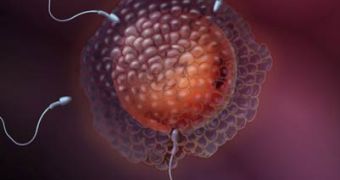Till now, it was real only in the science fiction movies. Now it's a fact: the first child has been born from a lab matured, frozen, thawed and then fertilized egg. In Canada. Three other moms are pregnant due to the same method. This special healthy baby girl was brought to life by one of 20 patients with polycystic ovarian syndrome (PCOS) involved in a trial at McGill Reproductive Center, Montreal, Canada.
"To date, the pregnancies reported have been the result of fertilization of frozen and then thawed oocytes that had been collected after ovarian stimulation. Unfortunately, some patients seeking fertility preservation may not have enough time to undergo ovarian simulation, or may suffer from a medical condition deemed by some oncologists as a relative contraindication to hormonal stimulation, such as estrogen-receptor-positive breast cancer," said team leader Dr. Hananel Holzer, an assistant professor at the Center who coordinates the fertility preservation program.
"In these circumstances, oocytes can be collected from the ovaries without hormonal stimulation, and the immature oocytes can be matured in the laboratory before being frozen or vitrified. But, until now, it was not known whether oocytes collected from unstimulated ovaries, matured in vitro and then vitrified, could survive thawing, be fertilized successfully and result in a viable pregnancy after embryo transfer."
"We have demonstrated for the first time that it is possible to do this. The other three pregnancies are ongoing. These results are preliminary and the pregnancy rate is probably associated with a learning curve; indeed three of the pregnancies were achieved in the last five patients."
The method is still new and has not yet been tested in cancer patients.
"We need to inform the patients about the early stage of these treatments without giving any false hopes."
Women with cancer diagnosis face the risk of turning sterile, as many treatments kill their ovarian reserve of oocytes. For the moment, the ovarian tissue could be removed, frozen and later re-transplanted, but there are chances for the tissue to be touched by metastatic cancer and could re-introduce the cancer in the woman's body.
Women suffering from PCOS are also prone to secondary effects when hormonally over-stimulating their ovaries, like the potentially deadly ovarian hyperstimulation syndrome (OHSS).
Achieving successful pregnancies from immature eggs could be crucial in these cases. 20 volunteers, with an average age of about 30, all infertile due to PCOS were selected for the trial. 290 immature oocytes were collected from them. The oocytes were grown mature in the lab for 1-2 days and 215 were frozen employing the Cryoleaf oocyte vitrification kit developed at McGill.
The eggs stayed frozen for up to a few months and then were de-frozen. 148 oocytes survived the thawing process and were fertilized via ICSI (intra-cytoplasmic sperm injection); 64 of the resulting embryos were transferred to the women. As IVM presents lower rates of implantation, more than one embryo was implanted to each patient.
All the resulting pregnancies were singleton pregnancies, except for one, which started as twins but one embryo was spontaneously reduced and thus a singleton pregnancy resulted. The team puts its success on the improvement of the media in which the immature oocytes were matured in the lab.
"Our research shows that it is possible to collect immature oocytes from unstimulated ovaries, mature them in vitro, freeze and thaw them and then achieve pregnancies and live births, without the risk of aggravating the patients' hormone-sensitive disease, delaying their treatment for cancer or re-instituting a metastatic malignant disease," said Holzer.

 14 DAY TRIAL //
14 DAY TRIAL //